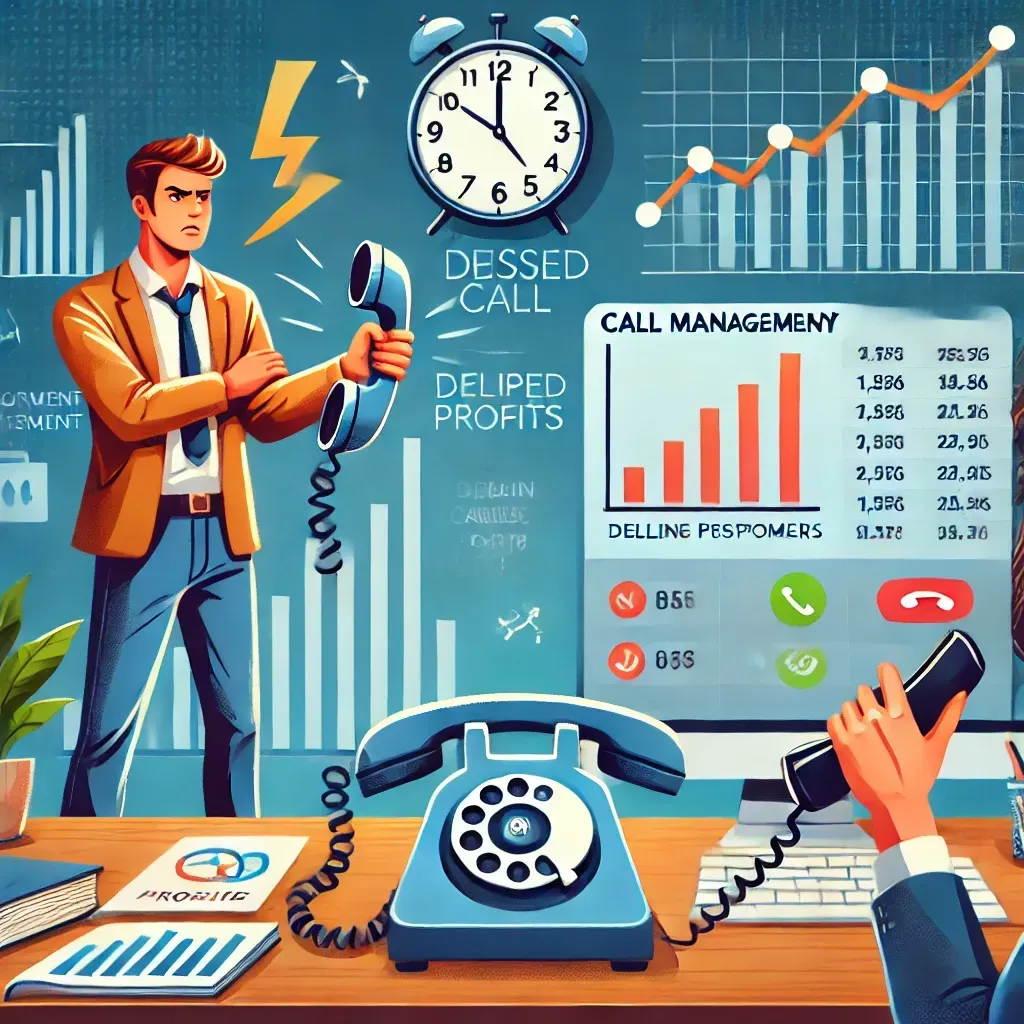The Million-Dollar Mistake: How Missed Calls Are Silently Killing Your Business
The Call That Changed Everything
It was a Monday morning, and Mark, a seasoned electrician, was already on-site troubleshooting a complicated wiring issue. His phone buzzed in his pocket—again. He knew it was probably a potential customer, but with both hands deep in an electrical panel and a deadline looming, answering just wasn’t an option.
By the time he wrapped up the job six hours later, he checked his phone. Seven missed calls.
He sighed, knowing some of these could be new business opportunities. He quickly started calling them back. The first one went to voicemail. The second answered—only to tell him they’d already booked someone else. The rest? Unreachable.
Later that week, Mark stopped by the local hardware store, only to overhear a conversation that made his stomach drop. A homeowner, desperate for an electrician, mentioned how they’d called a few businesses, but only one picked up—and that’s who they went with.
That’s when it hit him. Every missed call wasn’t just a missed conversation—it was a lost client, lost revenue, and a lost future referral.
The worst part? Mark didn’t even know how much business he was unknowingly turning away.
His story isn’t unique. Across industries, from plumbers to real estate agents to legal consultants, business owners are unknowingly throwing money away by not answering the phone. And it’s not just a minor inconvenience—it’s a silent killer of revenue growth.
How Much Is a Missed Call Really Costing You?
Many business owners assume that if a call is truly important, the customer will try again later. But the reality is far less forgiving.
Here’s what the data says:
📉 85% of missed calls never call back—meaning once a potential client moves on, they’re likely gone forever.
📉 67% of customers hang up if their call isn’t answered the first time—and most don’t leave voicemails.
📉 Every missed call is worth an average of $1,200 in lost revenue—when factoring in the value of leads, repeat business, and referrals.
If your business misses three calls per day, that’s:
- $3,800 in lost revenue per week
- $15,000 per month
- $1.3 million per year
Let that sink in. A million-dollar mistake, all because of a few missed rings.
And this isn’t just theory—businesses across industries report losing significant revenue simply because they weren’t available when the customer needed them.
So why do customers move on so quickly? And why don’t they try again?
Why Customers Don’t Call Back
(And Why They Shouldn’t Have To)
Think about the last time you called a business and didn’t get an answer. Did you leave a voicemail?
If you’re like most customers, probably not. You called the next business on your list.
Here’s why customers don’t bother calling back:
🔹 Impatience is the new normal. In today’s instant-access world, people expect quick responses. In fact, 75% of customers expect a response within five minutes.
🔹 Trust is built in seconds. If a customer can’t reach you, they assume you’re too busy, unreliable, or even out of business.
🔹 They don’t need you—they need a solution. When people call a business, they’re usually trying to solve a problem. Whether it’s fixing a broken air conditioner, booking a service, or getting legal advice, their problem doesn’t wait for you to be available.
A business that answers the call immediately has a much higher chance of securing the client—even if their prices are higher or their availability isn’t ideal.
The Psychology of Missed Calls: What You’re Really Losing
Every time a potential client calls your business, they’re making a decision based on trust—often without even realising it. A phone call is more than just an inquiry; it’s an emotional transaction, a subconscious checklist that determines whether they feel confident in giving you their business.
At that moment, the customer assumes three key things:
- 1️⃣ You exist and are actively operating. They’ve either found you through Google, a referral, social media, or word-of-mouth, and they’re assuming you’re ready and available to take their call.
- 2️⃣ You’re open for business and ready to help. The expectation is that a legitimate, well-functioning business will answer during normal business hours—or at the very least, provide a way to engage further.
- 3️⃣ You have the ability to solve their problem. They’re reaching out because they believe you offer a service they need. In their mind, calling you is the next logical step in getting that problem resolved.
But the moment they hear voicemail, everything changes.
The Instant Doubt Spiral: What Happens When You Don’t Pick Up
Customers are not patient. They live in a world where instant gratification is the norm, and they expect the same from the businesses they choose to engage with.
When their call goes unanswered, doubt sets in almost instantly:
🔹 “Did I call the right number?”
Even if they’re sure they dialled correctly, not getting an answer makes them question their choice. A simple moment of uncertainty can be enough to make them hesitate.
🔹 “Maybe they’re too busy for new clients.”
This is a killer. When someone urgently needs a service, they don’t want to feel like an afterthought. If they perceive you as too busy to take their call now, they assume you’ll also be too busy to prioritise them later.
🔹 “I’ll just call someone else.”
And this is the worst part. Once a potential client moves on, they’re not likely to come back.
What’s even more frustrating? If they do end up hiring your competitor and have a bad experience, they still might not return to you. Why? Because in their mind, you weren’t an option when they needed you.
Trust is Fragile—And It’s Built in Seconds
People decide whether they trust a business in less than 10 seconds. And in today’s digital world, businesses are competing not just on price, quality, or reputation, but on availability.
It’s not enough to be the best at what you do. You also have to be the business that’s there when customers need you.
The reality is, your competitors don’t have to be better than you. They just have to answer the phone when you don’t.
Would you trust a business that never answers your call? Probably not.
And neither will your customers.
How to Stop Losing Business to Missed Calls
(And Fix This Problem for Good)
Missed calls are a solvable problem. You don’t need to work 24/7 or be glued to your phone—you just need a smarter system.
1. Implement a 24/7 Answering Solution
Having an always-available phone answering system ensures that you never miss another client. Options include:
✔️ AI-powered virtual assistants that handle inquiries, take messages, and book appointments.
✔️ Call forwarding to another team member if you’re unavailable.
✔️ Live receptionist services for a more personalised touch.
2. Automate Call Follow-Ups
Even with a great system in place, some calls will inevitably be missed. That’s where automation comes in.
Instead of letting calls go unanswered, businesses can:
✔️ Send automatic text responses: “Hey, we just missed your call! Let us know how we can help.”
✔️ Offer online booking links so clients can schedule a callback at their convenience.
✔️ Use AI to follow up with leads and keep them engaged.
Studies show that businesses that respond within five minutes have a 10x higher chance of converting a lead than those that wait an hour or more.
3. Implement Smart Call Routing
If you run a business with multiple employees, one person shouldn’t be the only point of contact.
✔️ Set up call routing to ensure that someone always answers.
✔️ Use voicemail-to-text AI that transcribes messages instantly and emails them to you.
✔️ Integrate AI with customer service tools to provide instant answers to FAQs.
The key is to never leave a client hanging—because once they’re gone, they rarely come back.
Conclusion: What’s Your Missed Call Log Telling You?
Take a moment to check your phone.
How many missed calls do you have from the past week?
Now, multiply that by $1,200.
That’s how much potential revenue just disappeared.
You work too hard to let opportunities slip through the cracks. The good news? This is fixable.
By using the right systems, automations, and smart call handling, you can recover lost revenue and secure more clients—without working longer hours.
🚀
Want to stop chasing your tail with client comms?
Grab the toolkit that does the heavy lifting—so you don’t have to.











